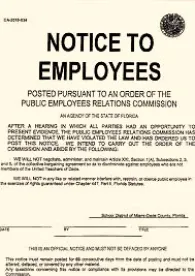As an UPDATE to an earlier article, please take notice that, on October 5, 2011, the National Labor Relations Board (“NLRB” or “Board”) announced that it would delay the effective date of its August 25 final rule that will require employers to post an NLRB-issued notice detailing employees’ unionization rights under the National Labor Relations Act (“NLRA”). Based on this new announcement, the effective date has been pushed back from November 14, 2011, until January 31, 2012. As a result, employers will have additional time to comply with the NLRB's unionization rights notice rule, as explained in the earlier posting and set forth again as follows for your ease of reference.
Specifically, the rule applies to almost all private-sector employers subject to the NLRA. Importantly, the rule applies to employers who do not have unionized workforces.
The Board’s stated motivation for implementing the posting mandate is its belief that many employees are unaware of their rights under the NLRA. Accordingly, the notice is intended to “increase knowledge of the NLRA among employees, in order to better enable the exercise of rights under the statute.” Thus, the notice informs employees of their NLRA rights, including the right to organize or join a union, to strike and picket, to raise work-related complaints with a government agency, or to choose not to do any of these activities. Additionally, the notice informs employees of numerous actions which employers and unions are prohibited from taking against them, in particular, with respect to the decision to join or not join a union. Lastly, the notice instructs employees on how to contact the NLRB.
Apart from physically posting the notice in all places where personnel rules and policies are regularly posted, employers must also post the notice electronically on any intranet or internet site where such rules and policies are customarily maintained. Additionally, for workforces in which at least 20% of employees are not proficient in English, employers are required to post a translated version of the notice – which will be provided by the Board – in the language which the employees speak.
Although the Board may not impose a fine on employers who do not post the notice, the Board could treat an employer’s failure to post the notice as an unfair labor practice. Significantly, the Board has authority under the rule to extend the 6-month statute of limitations for filing an unfair labor practice charge alleging other unfair labor practices against the non-posting employer. Moreover, the Board could consider an employer’s knowing failure to post the notice as evidence of unlawful motive in other unfair labor practice cases in which motive is an issue.
The notice is currently available for download from the NLRB’s website and may also be obtained from any one of the NLRB’s offices.


 />i
/>i

